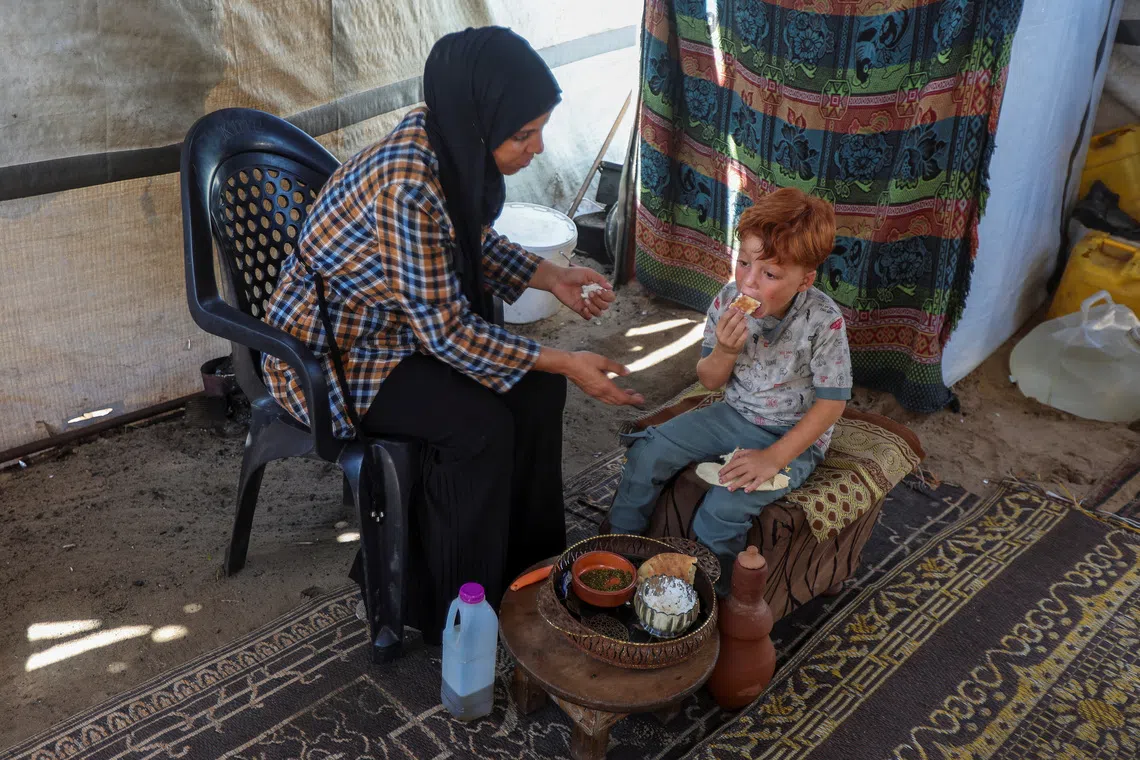Two years after she was pictured in grief, Gaza woman faces more misery
Sign up now: Get ST's newsletters delivered to your inbox

Ms Inas Abu Maamar helps feed her nephew Ahmed at their tent where they shelter after being displaced from their home, in Khan Younis.
PHOTO: REUTERS
Follow topic:
GAZA - Two years of Israeli bombardment of Gaza has piled grief upon grief for displaced Palestinian Inas Abu Maamar.
In the first days of the war, a Reuters photograph showed Ms Abu Maamar stricken in a hospital morgue, cradling the shrouded body of her five-year-old niece Saly.
Since then, Israeli air strikes and tank shells have killed many of her close relatives and left her bereaved, hungry and homeless, caring for her orphaned young nephew.
Israeli Prime Minister Benjamin Netanyahu has embraced a plan by US President Donald Trump for Gaza
All previous efforts to halt the conflict since Israel began its offensive in response to Hamas' deadly attack on October 7, 2023
Israeli air strike killed young niece
Saly was killed when an Israeli missile struck the family home in Khan Younis in southern Gaza.
Reuters photographer Mohammed Salem found Ms Abu Maamar embracing her body at the Nasser Hospital morgue in Khan Younis on October 17, 2023.
The blast also killed Ms Abu Maamar's aunt and uncle, her sister-in-law and her cousins, as well as Saly's baby sister Seba.
This summer, her father and her brother Ramez, Saly's father, were killed while bringing food back to the family.
They are among more than 67,000 Palestinians
Thousands more are believed to be lying dead under the rubble but not counted in the official death toll.
"The war destroyed us all. It destroyed our family, destroyed our homes. It left pain and loss in our hearts," said Ms Abu Maamar, who is now 38.
Israel launched its offensive in retaliation for the attack exactly two years ago in which Hamas gunmen burst through border defences from Gaza, killed about 1,200 people and dragged another 250 back into the enclave as hostages.
Israeli Prime Minister Benjamin Netanyahu has said he will pursue the war until the Palestinian militant group has been destroyed, and the army has intensified its campaign by pushing again into Gaza City
The Israeli military says it tries to avoid civilian casualties but strikes at Hamas wherever it sees militants emerge, accusing the group of hiding among the civilian population. Hamas denies that.
Life is tough in crowded tent encampment
Ms Abu Maamar and her remaining relatives have fled waves of Israeli bombing and ground incursions several times over the past two years and are now living in a crowded tent encampment on bare sand near the beach.
Conditions are harsh. Sickness is rife. Food and clean water are scarce. Israeli bombardments terrify the traumatised population.
Ms Abu Maamar's greatest concern is for her nephew Ahmed, the son of Mr Ramez and younger brother of Saly.
Having lost his mother, both sisters and maternal grandparents 10 days into the conflict, he lost his father and paternal grandfather when they were killed while fetching food in June after it had run out the previous day, Ms Abu Maamar said.
"His father would take him around, play with him, take him to the beach, take him around to see his aunts," she said of her nephew.
"His life really changed now. He's in the tent 24 hours (each day)," she said.
After his father's death, Ahmed spent a lot of time with a cat he named Loz. The cat died in August, Ms Abu Maamar said.
Concern that the war is not about to end
When Reuters interviewed Ms Abu Maamar a year ago, she said she was "waiting for the cascade of blood to stop".
She is still waiting, and fears the latest moves to end the war will fail unless Mr Trump puts more pressure on Israel.
"It is enough for us. What we lost is enough. A lot of our loved ones are gone, we lost them. We left (our homes) with them, and we will return without them," she said on Oct 5.
"My only fear is for the war to continue. We do not want it to continue. We want it to end once and for all." REUTERS

